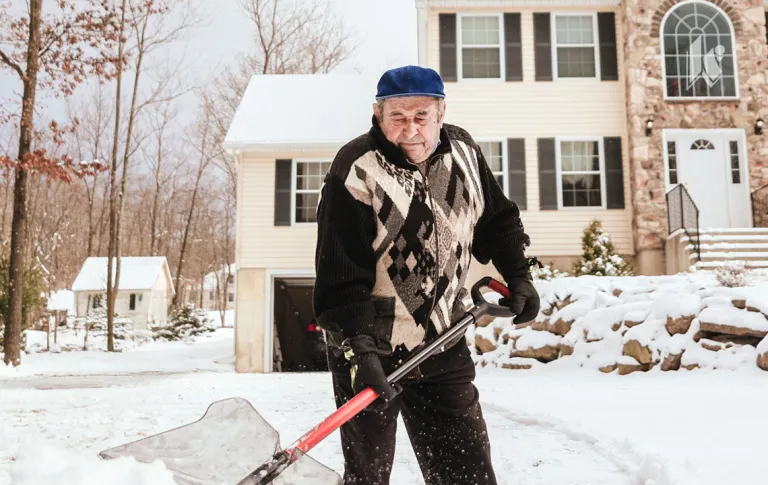
Winter can be the toughest season to go through, and this is especially true for older adults. Both extreme storms and regular winter days can pose high risks. Even people who’ve lived in this climate for years or decades can face new challenges as they get older.
Most of the risks associated with winter are from the outdoors: specifically, the cold, snow and ice, and wind. Therefore, when you’re outside, the primary focuses should be staying warm and not slipping. This can be easier said than done, but a good wardrobe will be the biggest help. Warm clothing worn in layers can help retain heat. Hats, gloves, and thick socks can play a big part in keeping you warm too. Shoes and boots with anti-slip soles, or adding grip treads over your current footwear, can reduce your risk of slippage.
Snow and ice removal, as well as other outdoor maintenance tasks, can be quite difficult to do in the winter. Even shoveling snow can be dangerous; it puts a high strain on the body, which in some cases can trigger things as extreme as heart attacks and strokes. If some of those maintenance tasks can be safely delayed until warmer weather, it’s highly recommended to wait. For things that need to be addressed right away (including snow and ice removal), consider hiring help. If you want to tackle these issues yourself, remember to take frequent breaks indoors.
The outdoors isn’t the only risk area during the winter months. There are numerous indoor dangers as well. Indoor areas aren’t guaranteed to be warm just because they’re indoors. Additionally, older bodies have a harder time giving signals that they feel cold. Paired together, and sometimes older adults suffer from cold exposure in their own homes. Use a thermometer or a thermostat to help gauge the temperature, and try to keep it between 68 and 70 degrees Fahrenheit.
Heating the home has its own maintenance tasks to keep in mind. Follow the instructions and safety procedures for your chosen heating appliance. Make sure your smoke detectors and carbon monoxide detectors are in working order, so they can warn you if something goes wrong. And remember, don’t use your stove or oven to heat the whole house. The dangers from doing that are very high. (However, frequent baking and cooking during the colder months is highly encouraged!)
For emergencies or unusual situations, planning ahead of time can help mitigate the worst of the problem. They can include:
- Snowstorms
- Power outages
- Furnace breaking down
- Burst pipes
Each of these situations requires different solutions. But, in general, these are some basic things that can be done beforehand.
- Stock up on food, water, and medication.
- Have the phone numbers of essential services and repair companies written down.
- In case of extreme situations, have an emergency bag packed with some clothes and medications in case you need to stay elsewhere.
- Let a family member, loved one, or trusted friend know these plans in advance, in case communication is lost.
Living at home as an older adult can present some new challenges. But as you get older, dealing with home maintenance can become more and more of a burden. Kingsway’s Independent Living apartments have maintenance-free living to help our residents’ needs and on-premise security. Our apartments will allow you to keep your independence, while letting you focus on what really matters. Reach out to us today to learn more, or to schedule a tour of our facilities.